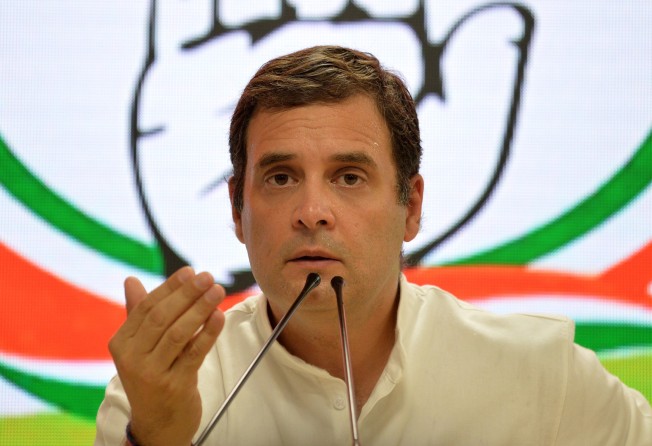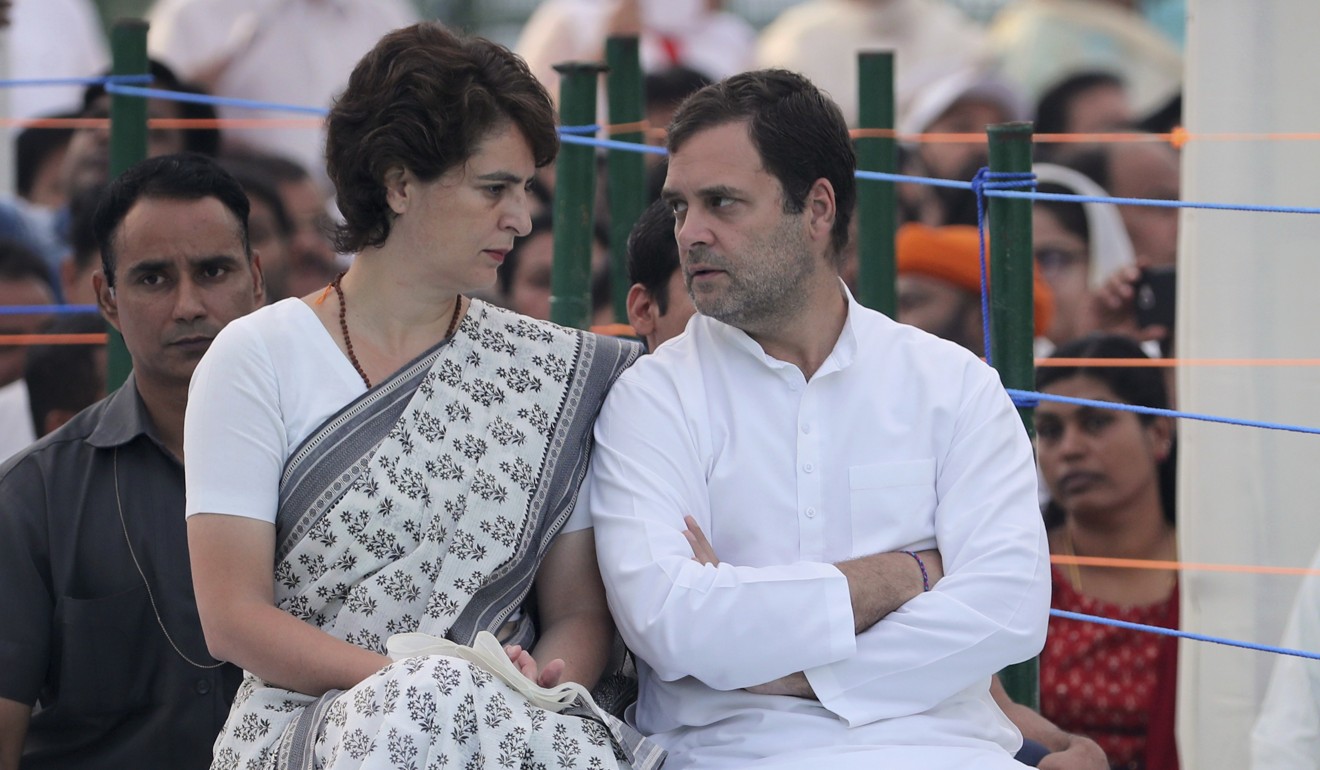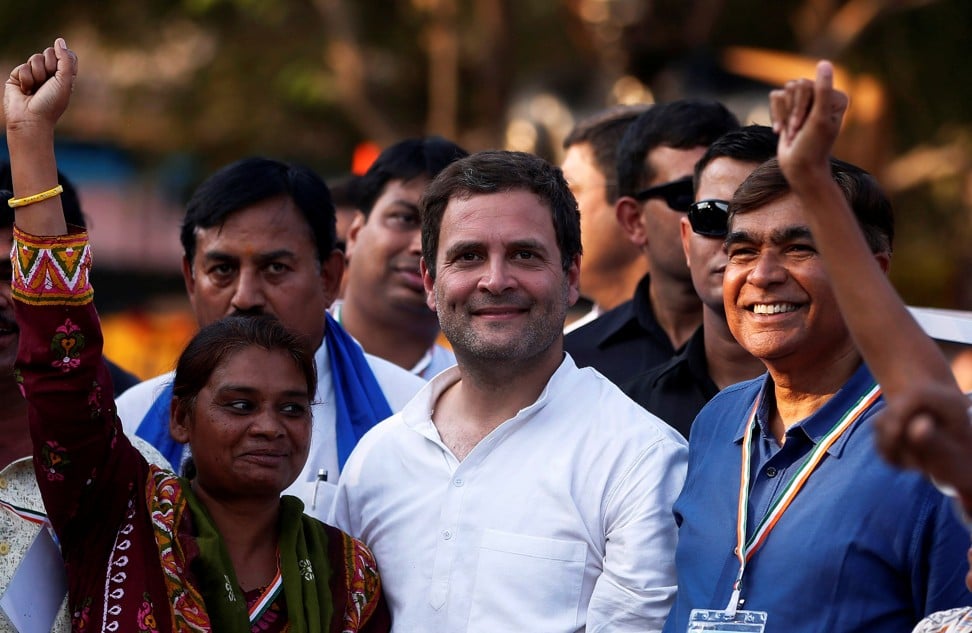It is an honour for me to serve the Congress Party, whose values and ideals have served as the lifeblood of our beautiful nation.
I owe the country and my organisation a debt of tremendous gratitude and love.
Jai Hind pic.twitter.com/WWGYt5YG4V
— Rahul Gandhi (@RahulGandhi) July 3, 2019
Will Rahul Gandhi’s exit make Modi’s dream for a ‘Congress-free India’ come true?
- In a road map outlined in his resignation letter, Gandhi advised the Congress to appoint a leader from outside the Nehru-Gandhi dynasty, and to make ‘radical’ transformations – plans Congress leaders fear to adopt
- As the party struggles to revive from a bruising defeat, Modi’s ruling BJP has meanwhile started drawing up battle plans to widen its lead in the 2024 general election

This week, workers of India’s main opposition party, the Indian National Congress, gathered outside the party’s headquarters in New Delhi and went on a mass, indefinite sit-in.
Their demand? That party chief Rahul Gandhi – who led the Congress to a humiliating defeat to Prime Minister Narendra Modi’s Bharatiya Janata Party (BJP) in the recent general elections – continue in his post.
But the orchestrated sit-in had the opposite effect. On Wednesday, Gandhi, ending all speculation, shared his resignation letter on social media.
In his four-page letter, Gandhi called for a “radical” transformation in order for Congress to battle the BJP and asked that the party take “hard decisions” and hold “numerous people” accountable for the crushing defeat. But more than anything else, Gandhi’s resignation has closed the door to any other member of the Gandhi family being appointed as the Congress chief.
For a party that has, for the most part of postcolonial India, been led by a member of the Nehru-Gandhi dynasty, the moment is filled with existential anxiety.
At the end of the Modi government’s second term, the Congress would have gone the longest ever without being in power. It currently stands at one of its lowest seat tallies in the parliament, at 53 seats, marginally better than the disastrous tally of 44 it won in the 2014 elections. In at least 17 states and union territories of the total 36, the Congress failed to win a single seat.
The last time that the party was led by a non Gandhi-dynasty member between 1996-1998, the party disintegrated, with some of its most senior leaders walking away to form their own outfits. These leaders went on to become some of the most popular regional leaders in the country, like current West Bengal chief minister Mamata Banerjee.
Now, faced with an aggressive BJP led by Modi who has publicly declared a “Congress-free India” as his aim, the Congress faces an uncertain future: can it revive itself back into relevance or will it crumble even further?
The signs for the Congress are ominous.
Just six weeks after the announcement of the election results, the BJP has already set its eyes on a bigger electoral win in 2024. It has appointed a new working president and even started drawing up plans to expand its footprint in the country.
In contrast, the Congress is bleeding. Many of its state unit heads have resigned, and other leaders are likely to follow suit. Its local governments in at least two states, Karnataka and Madhya Pradesh, are perilously close to collapsing.
In such circumstances, Gandhi stepped down, saying: “It would be unjust to hold others accountable but ignore my own responsibility as President of the party.”
The letter, however, raised eyebrows with Gandhi saying that he stood “completely alone” in fighting Modi. He had made a similar reference after the election results when, according to reports, he lashed out at senior leaders for not backing him up in the campaign.
For Aarthi Ramachandran, author of Decoding Rahul Gandhi, this is a continuing strand in the Congress leader’s career. “He has always fashioned himself as a rebel and an outsider because he is, in a way, the ultimate insider – being born in the most powerful political family in India,” Aarthi said.
Even when Congress was in power at the Centre for two consecutive terms, Gandhi did not hesitate to distance himself from the party and the government’s stated positions. Aarthi believes the position was necessary for Gandhi to shed the image of a privileged dynast – one that Modi and the BJP have only been too happy to exploit repeatedly.
In many ways, the roots of Gandhi’s failure lies in a perception battle that he possibly lost very early on. Since his electoral debut in 2004, Gandhi has been criticised for his questionable oratory skills and frequent gaffes. Using this, the BJP has tried to portray Gandhi as a political lightweight..
“Modi and the BJP have, time and again, been able to prove that this image is for real. Gandhi has not shown a clear sense of direction in his politics. There has been no clarity on what it is he wants to be,” Aarthi said.
However, Congress leaders say the comparisons between Modi, who has over four decades of experience in politics, and Gandhi, who has been in politics for 15 years, are unfair.
“Leadership cannot only be defined by oratory skills. A leader must also be able to administer and hold people together, both of which Gandhi did very well,” said Asif Zakaria, a Mumbai-based Congress leader.
The perception problem, coupled with a string of high-profile electoral defeats – including losing Uttar Pradesh, India’s most electoral state, in 2007, as well as leading the Congress to its worst showing as vice-president in 2014 – made his leadership increasingly untenable.

While there is no doubt that transformation must happen for the Congress to compete with the BJP, opinions are divided over how this must happen.
Gandhi’s own road map – of appointing someone from outside the family, undergoing “radical” transformations – is one that Congress leaders fear to adopt.
“The Congress, in its constitution, is not a cadre-based party like the BJP. Hence, it cannot be run with an iron grip. The new party chief will have to have the ability to take various factions and interests along,” Zakaria said.
However, this is easier said than done. The Congress, after years of retaining power, has spawned many senior leaders, all of whom would want to stake a claim to the seat.
“In the Congress, all second-rung leaders see each other as equals. Hence, making a choice among them is bound to disappoint many,” said another Congress member who declined to be named.
Many fear the impending leadership tussle could mark the beginning of the Congress’ disintegration. Congress leaders believe the continued leadership by a Gandhi would prevent such infighting.
For now, that seems unlikely. While Gandhi’s sister, Priyanka Gandhi Vadra, has finally entered politics, it is unlikely she would make party chief anytime now. Her own record has been poor – under her, the Congress lost Amethi, an old party stronghold.
What the Congress’ dismal showing has done is to take wind out of the opposition parties’ efforts to tackle the BJP’s rise.
Crucial election alliances have either broken up or parties have drifted apart, opposition leaders have gone incommunicado, even as regional elections are coming up in three crucial states, in less than 100 days. The new Congress chief will have their work cut out.
